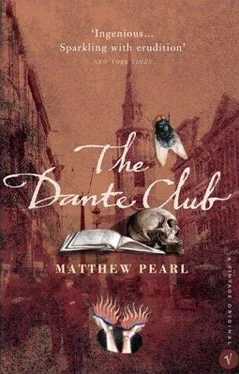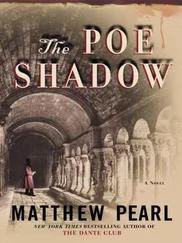“Mr. Fields, it is in the name of society that we speak. Your authors hang on to the skirts of your coat. Advise them properly. Do not mention this meeting if you like, and neither shall I. I know you wish your house to be held in esteem, and I do not doubt that you would consider all the repercussions of your publication.”
“Thank you for that faith, Dr. Manning.” Fields breathed into his wide spade of a beard, struggling to maintain his famous diplomacy. “I have considered the repercussions thoroughly and look forward to them. If you do not wish to proceed with the university’s pending publications, I shall happily return the plates to your possession at once without cost. You know, I hope, that you shall offend me if you say aught disparaging about my authors to the public. Ah, Mr. Osgood.”
Fields’s senior clerk, J. R. Osgood, shuffled in and Fields ordered a tour of the new offices for Dr. Manning.
“Unnecessary.” The word seeped out from Manning’s stiff patrician beard, durable as the century, as he stood. “I suppose you anticipate a good many pleasant days to come in this place, Mr. Fields,” he said, throwing a cold glance at the shining black walnut paneling. “There will be times, remember, when even you shall not be able to protect your authors from their ambitions.” He bowed super-politely and started down the stairwell.
“Osgood,” Fields said, and pushed the door closed. “I want you to place a gossip bit in the New York Tribune for the translation.”
“Ah, is Mr. Longfellow done already?” Osgood asked brightly.
Fields pursed his full, overbearing lips. “Did you know, Mr. Osgood, that Napoleon once shot a book peddler for being too aggressive?”
Osgood considered this. “No, I hadn’t heard that, Mr. Fields.”
“The happy advantage of a democracy is that we are free to puff our books as hard as we can manage and be perfectly safe of any harm. I want no family of any respectability to sleep unapprised by the time we go to the binders.” And anyone within a mile of his voice would believe he would make that happen. “To Mr. Greeley, New York, for immediate inclusion in the ‘Literary Boston’ page.” Fields’s fingers were plunking and strumming the air, a musician playing a remembered piano. His wrist cramped when he wrote, so Osgood was a surrogate hand for most of the publisher’s writing, including his fits of poetry.
It came together in his mind in almost finished form.” ‘WHAT THE LITERARY MEN ARE DOING IN BOSTON: It is rumored that a new translation is in the press of Ticknor, Fields and Co., which will attract considerable attention in many quarters. The author is said to be a gentleman of our city, whose poetry has for many years inspired public adoration on both sides of the Atlantic. We understand furthermore that this gentleman has recruited help from the finest literary minds of Boston…’ Hold there, Osgood. Make that ‘of New England.’ We don’t want old Greene to simper, do we?”
“Of course not, sir,” Osgood managed to reply between scribblings.
“ ‘…the finest minds of New England to manage the task of revising and completing his new and elaborate poetical translation. The content of the work is at this time unknown, except to say that it has never before been read in our country, and shall transform the literary landscape.’ Et cetera. Have Greeley mark it Anonymous Source.’ Have you got all that?”
“I shall send it by the first post in the morning,” said Osgood.
“Wire it to New York.”
“For printing next week?” Osgood thought he had misheard.
“Yes, yes!” Fields threw up his hands. The publisher was rarely flustered. “ And , I tell you, we’ll have another ready the week after!”
Osgood turned back cautiously as he reached the door. “What was Dr. Manning’s business here this afternoon, Mr. Fields, if I might ask?”
“Nothing to think of.” Fields blew a long sigh into his beard that contradicted this. He returned to the fat cushion of stacked manuscripts on his window seat. Below them was the Boston Common, where pedestrians still clung to summer linens, even a few straw hats. As Osgood started to leave again, Fields felt the desire to explain. “If we go ahead with Longfellow’s Dante, Augustus Manning will see to it that all publishing contracts between Harvard and Ticknor and Fields are canceled.”
“Why, that’s thousands of dollars in value—tens more over the next years!” Osgood said with alarm.
Fields nodded patiently. “Hmm. Do you know, Osgood, why we did not publish Whitman when he brought us his Leaves of Grass ?” He did not wait for a reply. “Because Bill Ticknor did not want to call down trouble on the house over the carnal passages.”
“May I ask whether you regret that, Mr. Fields?”
He was pleased with the question. His tone modulated from employer’s to mentor’s. “No I don’t, my dear Osgood. Whitman belongs to New York, as did Poe.” That name he said more bitterly, for reasons that still smoldered. “And I’ll let them keep what few they have. But from true literature we mustn’t ever cower, not in Boston. And we shall not now.”
He meant “now that Ticknor was gone.” It was not that the late William D. Ticknor had no sense of literature. In fact, it might be said the Ticknors had literature running in their blood, or at least in some primary organ, as their cousin George Ticknor had once been Boston’s literary authority, preceding Longfellow and Lowell as the first Smith Professor at Harvard. But William D. Ticknor had started in Boston in the field of complex financing, and he brought to publishing, which at the time was little more than bookselling, the mind of a fine banker. It was Fields who had recognized genius in half-finished manuscripts and monographs, Fields who had nurtured friendships with the great New England authors as other publishers closed their doors for lack of profits or spent too much time retailing.
Fields, while a young clerk, was even said to exhibit preternatural (or “very queer,” as the other clerks put it) abilities; he could predict by the demeanor and appearance of a customer what book would be desired. At first he kept this to himself, but when the other clerks discovered his gift, it became a source of frequent wagers, and those who bet against Fields always ended the day unhappily. Fields would soon after transform the industry by convincing William Ticknor to reward authors rather than cheat them, and by realizing that publicity could turn poets into personalities. As a partner, Fields bought out The Atlantic Monthly and The North American Review as venues for his authors.
Osgood would never be a man of letters like Fields, a litterateur, and so hesitated to compare ideas of True Literature. “Why would Augustus Manning threaten such a measure? It’s extortion, that’s what,” he said indignantly.
At this Fields smiled to himself, thinking of how much there still was to teach Osgood. “We extort everyone we know, Osgood, or nothing should get done. Dante’s poetry is foreign and unknown. The Corporation lords over Harvard’s reputation by controlling every word allowed past the College gates, Osgood—anything unknown, anything unknowable, stands to frighten them beyond measure.” Fields picked up the pocket edition of Dante’s Divina Commedia he had found in Rome. “Here is revolt enough between two covers to unravel it all. The mind of our country is moving with the speed of a telegraph, Osgood, and our great institutions are stagecoaching behind it.”
“But why would their good name be affected in this instance? They have never sanctioned Longfellow’s translation.”
The publisher mocked indignation. “I rather think not. But they still have association, most fearful, for it is something that can scarce be erased.”
Читать дальше












